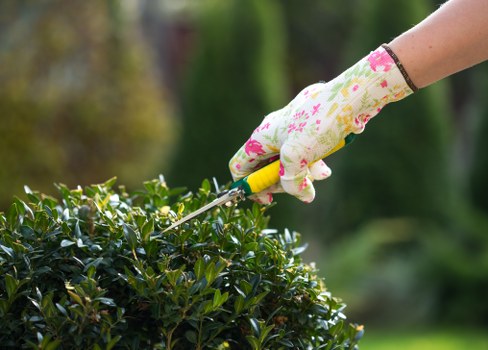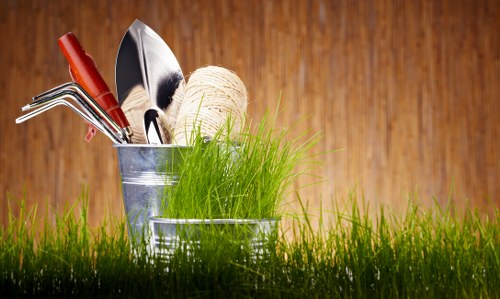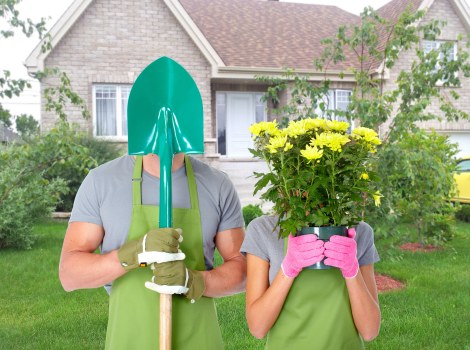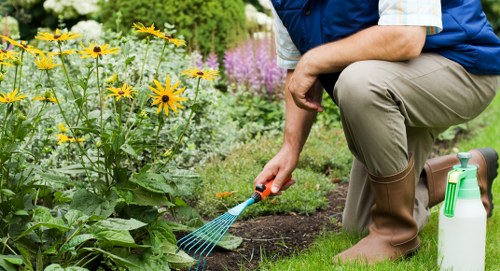Landscape Gardeners in Mowing Sucks: Understanding the Challenges
Introduction to Landscape Gardening

Landscape gardening is an art and science that transforms outdoor spaces into aesthetically pleasing and functional areas. Professional landscape gardeners play a crucial role in maintaining these spaces, ensuring that they remain beautiful and sustainable. However, one aspect of their work that often receives criticism is lawn mowing.
Mowing is a fundamental task in landscape maintenance, but it comes with its set of challenges and drawbacks. In this article, we delve into why mowing might not always be the best approach and explore alternative solutions that can enhance your garden's beauty without the downsides associated with traditional mowing practices.
The phrase "Mowing Sucks" captures the frustration many gardeners feel regarding this repetitive and sometimes detrimental task. Let's explore the reasons behind this sentiment and what can be done to improve the situation.
The Drawbacks of Traditional Mowing

While mowing is essential for lawn maintenance, it has several negative impacts on both the environment and the health of your garden. Here are some key drawbacks:
- Environmental Impact: Gas-powered mowers emit harmful pollutants that contribute to air pollution and carbon emissions.
- Soil Degradation: Frequent mowing can compact the soil, reducing its ability to retain water and nutrients.
- Biodiversity Loss: Regular mowing can eliminate habitats for beneficial insects and other wildlife.
- Resource Intensive: Mowing requires significant amounts of water and energy, especially in maintaining large lawns.
These factors combined make traditional mowing a less sustainable option for modern landscaping needs.
Health Implications for Gardeners

Aside from environmental concerns, mowing can have several health implications for landscape gardeners:
- Physical Strain: Continuous mowing can lead to musculoskeletal issues, including back pain and repetitive strain injuries.
- Exposure to Chemicals: Herbicides and fertilizers used in lawn maintenance can pose health risks if not handled properly.
- Noise Pollution: Gas-powered mowers generate significant noise, which can lead to hearing loss over time.
- Air Quality: Exhaust fumes from mowers can affect respiratory health.
These health concerns emphasize the need for more sustainable and less taxing methods of lawn maintenance.
Alternative Lawn Maintenance Practices

Given the drawbacks of traditional mowing, exploring alternative lawn maintenance practices is essential. Some popular alternatives include:
- Mulching: Using mulch instead of traditional grass can reduce the need for mowing and enhance soil health.
- Native Plant Integration: Incorporating native plants can reduce water usage and support local biodiversity.
- Manual Weeding: Hand-pulling weeds minimizes chemical use and soil disruption.
- Electric Mowers: Switching to electric mowers reduces emissions and noise pollution.
These alternatives not only address the issues associated with mowing but also contribute to a more sustainable and resilient garden ecosystem.
Benefits of Reducing Mowing Frequency

Reducing the frequency of mowing can have several benefits for both gardeners and the environment:
- Enhanced Soil Health: Less mowing means less soil disturbance, promoting better water retention and nutrient cycling.
- Increased Biodiversity: Allowing grass to grow longer provides habitats for insects and other small creatures.
- Water Conservation: Reduced mowing often correlates with less water usage, especially in drought-prone areas.
- Energy Savings: Fewer mowing sessions save energy and reduce greenhouse gas emissions.
Implementing these practices can lead to a healthier, more sustainable garden that requires less maintenance over time.
Implementing Sustainable Mowing Practices

1. Choose the Right Mower
Selecting a sustainable mower is the first step towards reducing the negative impacts of mowing. Electric mowers are a great alternative to gas-powered ones, offering quieter operation and zero emissions.
2. Mow at the Proper Height
Adjusting the mower height to allow grass to grow longer can improve its health and resilience, reducing the frequency of mowing required.
3. Practice Mulching
Mulching mowers chop grass clippings finely and return them to the soil, enhancing fertility and reducing waste.
Additional Tips:
- Regular Maintenance: Keep your mower well-maintained to ensure efficient operation.
- Seasonal Adjustments: Modify your mowing schedule based on seasonal growth patterns.
- Integrated Pest Management: Use natural pest control methods to maintain a healthy lawn.
By adopting these sustainable mowing practices, landscape gardeners can minimize the drawbacks associated with traditional mowing while maintaining a beautiful lawn.
Case Studies: Successful Landscaping Without Heavy Mowing

Several landscape projects have successfully minimized or eliminated the need for heavy mowing. These case studies highlight innovative approaches to sustainable lawn maintenance:
- California Xeriscaping: Utilizing drought-resistant plants to create a low-maintenance landscape that requires minimal mowing.
- English Cottage Gardens: Incorporating wildflower meadows that thrive without regular mowing, promoting biodiversity.
- Urban Roof Gardens: Designing rooftop gardens with integrated plantings that reduce the need for frequent lawn maintenance.
These examples demonstrate that with thoughtful planning and design, beautiful and functional landscapes can be achieved without the drawbacks of traditional mowing.
Economic Considerations

Reducing mowing frequency and adopting sustainable practices can also have economic benefits:
- Cost Savings: Less mowing means lower fuel and maintenance costs for mowers.
- Water Savings: Reduced water usage translates to lower utility bills.
- Increased Property Value: Sustainable landscaping can enhance property appeal and value.
- Long-Term Investment: Healthier lawns require fewer inputs and repairs over time.
Investing in sustainable lawn maintenance not only benefits the environment but also offers financial advantages for homeowners and businesses alike.
Environmental Impact of Mowing

The environmental consequences of frequent mowing extend beyond air pollution and soil degradation:
- Carbon Footprint: Gas-powered mowers contribute significantly to greenhouse gas emissions.
- Water Runoff: Compacted soil from mowing reduces water infiltration, increasing runoff and erosion.
- Loss of Pollinators: Short grass heights discourage pollinator-friendly plants, impacting bee and butterfly populations.
- Noise Pollution: Constant mowing noise can disrupt local wildlife and reduce the overall quality of the natural environment.
Understanding these impacts is crucial for landscape gardeners aiming to create environmentally responsible gardens.
Innovations in Lawn Care

Technological advancements are paving the way for more sustainable lawn care solutions:
- Robotic Mowers: Automated mowers can optimize mowing schedules, reducing energy consumption and emissions.
- Smart Irrigation Systems: These systems adjust watering based on weather conditions, conserving water.
- Organic Fertilizers: Using natural fertilizers enhances soil health without harmful chemicals.
- Permeable Pavers: Integrating permeable surfaces in gardens reduces runoff and improves water management.
Embracing these innovations can lead to more efficient and eco-friendly lawn maintenance practices.
Community and Educational Initiatives

Educating the community about sustainable lawn care practices is essential for widespread adoption:
- Workshops and Seminars: Offering training sessions on alternative lawn maintenance methods.
- Community Gardens: Promoting shared spaces that utilize sustainable practices.
- Resource Centers: Providing access to information and tools for eco-friendly gardening.
- Incentive Programs: Encouraging homeowners to adopt sustainable practices through rewards and recognition.
These initiatives foster a culture of sustainability and empower individuals to make informed decisions about their landscape maintenance.
Future of Landscape Gardening

The future of landscape gardening lies in sustainability and innovation. Embracing practices that reduce the reliance on traditional mowing can lead to more resilient and vibrant outdoor spaces:
- Sustainable Design: Incorporating elements that require minimal maintenance and support local ecosystems.
- Climate Adaptation: Selecting plants and practices that are resilient to changing climate conditions.
- Technology Integration: Utilizing smart tools and systems to enhance efficiency and reduce environmental impact.
- Community Engagement: Building networks that support sustainable gardening through shared knowledge and resources.
By prioritizing these aspects, landscape gardeners can contribute to a greener and more sustainable future.
Conclusion: Rethinking Mowing in Landscape Gardening

While traditional mowing has been a cornerstone of landscape maintenance, its drawbacks cannot be ignored. From environmental impacts to health implications, the cons of frequent mowing highlight the need for alternative approaches. By adopting sustainable practices, integrating innovative solutions, and fostering community awareness, landscape gardeners can create beautiful, resilient, and eco-friendly gardens.
Don't let mowing hold your garden back. Embrace sustainable landscaping today and reap the benefits of a healthier, more vibrant outdoor space. Contact us today to learn how we can help transform your garden into a sustainable haven.